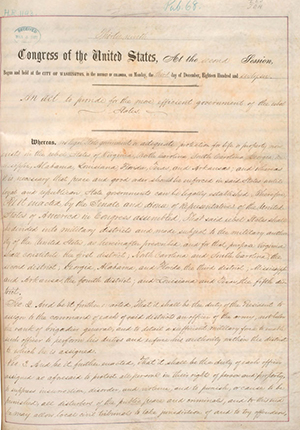Historic Document
Reconstruction Acts (1867-1868)
Congress | 1867-1868

National Archives, RG 11, General Records of the U.S. Government
Summary
Republicans in Congress were livid at the continuing resistance of Southern states in passing legislation like the Black Codes, were horrified by the political and racial violence occurring in Southern cities like New Orleans, and were fearful that Confederates who had just been in open war against the national government would soon be restored to positions of authority given the leniency of President Andrew Johnson towards the rebels. The Reconstruction Acts represented Congress’s attempt to take over the Reconstruction project. Passed over serial vetoes by Johnson, the Acts imposed military government in most of the rebel states and conditioned their readmission to the Union on specific political and civil rights benchmarks, including ratification of the proposed Fourteenth Amendment.
Selected by

Allen C. Guelzo
Director, Initiative on Politics and Statesmanship, James Madison Program in American Ideals and Institutions, Princeton University

Darrell A.H. Miller
Melvin G. Shimm Professor of Law at Duke University School of Law
Document Excerpt
An Act to provide for the more efficient Government of the Rebel States:
Whereas no legal State governments or adequate protection for life or property now exists in the rebel States of Virginia, North Carolina, South Carolina, Georgia, Mississippi, Alabama, Louisiana, Florida, Texas and Arkansas; and whereas it is necessary that peace and good order should be enforced in said States until loyal and republican State governments can be legally established: Therefore…said rebel States shall be divided into military districts and made subject to the military authority of the United States as hereinafter prescribed, and for that purpose Virginia shall constitute the first district; North Carolina and South Carolina the second district; Georgia, Alabama and Florida the third district; Mississippi and Arkansas the fourth district; and Louisiana and Texas the fifth district.
Sec. 2 And be it further enacted, That it shall be the duty of the President to assign to the command of each of the said districts an officer of the army . . .
Sec. 3 And be it further enacted, That it shall be the duty of each officer assigned as aforesaid, to protect all persons in their rights of person and property, to suppress insurrection, disorder, and violence, and to punish, or cause to be punished, all disturbers of the public peace and criminals; and to this end he may allow local civil tribunals to take jurisdiction of and to try offenders, or, when in his judgment it may be necessary for the trial of offenders, he shall have power to organize military commissions or tribunals for that purpose, and all interference under color of State authority with the exercise of military authority under this act, shall be null and void….
Sec. 5 And be it further enacted, That when the people of any one of said rebel States shall have formed a constitution of government in conformity with the Constitution of the United States in all respects, framed by a convention of delegates elected by the male citizens of said State, twenty-one years old and upward, of whatever race, color, or previous condition, who have been resident in said State for one year previous to the day of such election, except such as may be disfranchised for participation in the rebellion or for felony at common law, and when such constitution shall provide that the elective franchise shall be enjoyed by all such persons as have the qualifications herein stated for electors of delegates, and when such constitution shall be ratified by a majority of the persons voting on the question of ratification who are qualified as electors for delegates, and when such constitution shall have been submitted to Congress for examination and approval, and Congress shall have approved the same, and when said State, by a vote of its legislature elected under said constitution, shall have adopted the amendment to the Constitution of the United States, proposed by the Thirty-ninth Congress, and known as article fourteen, and when such article shall have become a part of the Constitution of the United States, said State shall be declared entitled to representation in Congress…. Provided, That no person excluded from the privilege of holding office by said proposed amendment to the Constitution of the United States, shall be eligible to election as a member of the convention to frame a constitution for any of said rebel States, nor shall any such person vote for members of such convention.
Sec. 6 And be it further enacted, That, until the people of said rebel States shall be by law admitted to representation in the Congress of the United States, any civil governments which may exist therein shall be deemed provisional only….
An Act supplementary to an Act entitled “An Act to provide for the more efficient Government of the Rebel States,” passed March second, eighteen hundred and sixty-seven, and to facilitate Restoration
Be it enacted…That before the first day of September, eighteen hundred and sixty-seven, the commanding general in each district…shall cause a registration to be made of the male citizens of the United States, twenty-one years of age and upwards, resident in each county or parish in the State or States included in his district, which registration shall include only those persons who are qualified to vote for delegates by the act aforesaid, and who shall have taken and subscribed the following oath or affirmation: “I, _____, do solemnly swear (or affirm), in the presence of Almighty God, that I am a citizen of the State of _____; that I have resided in said State for _____ months next preceding this day, and now reside in the county of _____ or the parish of _____, in said State (as the case may be); that I am twenty-one years old; that I have not be disfranchised for participation in any rebellion or civil war against the United States, nor for felony committed against the laws of any State or of the United States; that I have never been a member of any State legislature, nor held any executive or judicial office in any State and afterwards engaged in insurrection or rebellion against the United States, or given aid or comfort to the enemies thereof; that I have never taken an oath as a member of Congress of the United States, or as an officer of the United States, or as a member of any State legislature, or as an executive or judicial officer of any State, to support the Constitution of the United States, and afterwards engaged in insurrection or rebellion against the United States, or given aid or comfort to the enemies thereof; that I will faithfully support the Constitution and obey the laws of the United States, and will to the best of my ability, encourage others so to do, so help me God”; which oath or affirmation may be administered by any registering officer.
An Act supplementary to an Act entitled “An Act to provide for the more efficient Government of the Rebel States,” passed on the second day of March, eighteen hundred and sixty-seven, and the Act supplementary thereto, passed on the twenty-third day of March, eighteen hundred and sixty-seven:
Sec. 2. And be it further enacted, That the commander of any district named in said act shall have power, subject to the disapproval of the General of the army of the United States... whenever in the opinion of such commander the proper administration of said act shall require it, to suspend or remove from office, or from the performance of official duties and the exercise of official powers, any officer or person holding or exercising, or professing to hold or exercise, any civil or military office or duty in such district under any power, election, appointment or authority derived from, or granted by, or claimed under, any so-called State or the government thereof, or any municipal or other division thereof, and upon such suspension or removal such commander, subject to the disapproval of the General as aforesaid, shall have power to provide from time to time for the performance of the said duties of such officer or person so suspended or removed, by the detail of some competent officer or soldier of the army, or by the appointment of some other person, to perform the same, and to fill vacancies occasioned by death, resignation, or otherwise….
Sec. 4. And be it further enacted, That the acts of the officers of the army already done in removing in said districts persons exercising the functions of civil officers, and appointing others in their stead, are hereby confirmed: Provided, That any person heretofore or hereafter appointed by any district commander to exercise the functions of any civil office, may be removed either by the military officer in command of the district, or by the General of the army. And it shall be the duty of such commander to remove from office as aforesaid all persons who are disloyal to the government of the United States, or who use their official influence in any manner to hinder, delay, prevent, or obstruct the due and proper administration of this act and the acts to which it is supplementary.
An Act to amend the Act passed March twenty-third, eighteen hundred and sixty-seven, entitled “An Act supplementary to ‘An Act to provide for the more efficient Government of the rebel States,’ passed March second, eighteen hundred and sixty-seven, and to facilitate their restoration.”
…any election authorized by the act passed March twenty-three, eighteen hundred and sixty seven…shall be decided by a majority of the votes actually cast….




